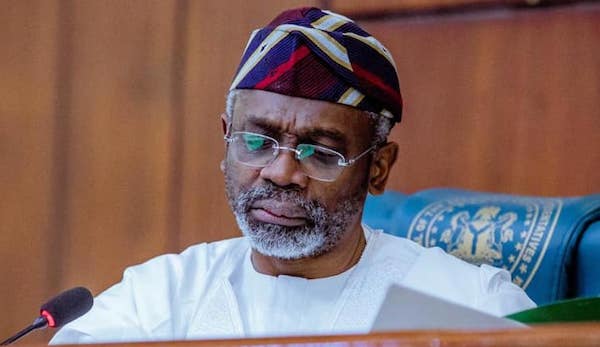News
36 CSOs say Gbajabiamila’s Infectious Disease Bill a threat to human rights, list other defaults

A group of Civil Society Organisations (CSO’s) have raised concerns over the ‘Control of Infectious Diseases Bill’ being sponsored by Femi Gbajabiamila, Speaker of the Nigerian House of Representatives.
In a statement signed by 36 of them, the CSO’s pointed out several issues with the proposed bill including saying that it posed threats to human rights and abuse of power.
On Tuesday, April 28, 2020, the National Assembly resumed legislative activities after one month of recess, following the outbreak of the COVID-19 pandemic.
Upon resumption, the House of Representatives considered the Infectious Diseases Bill, which was co-sponsored by Gbajabiamila, Rep Pascal Obi, and Rep Tanko Sununu.
The bill, which seeks to repeal the obsolete Quarantine Act of 1929 and enact the Control of Infectious Diseases Bill, make provisions relating to quarantine and regulations for preventing the introduction into and spread of dangerous infectious diseases in Nigeria, and for other related matters.
The bill passed first and second reading at plenary under controversial circumstances and was said to have been considered for third reading the same day, if not that some lawmakers resisted it.
It their response, the CSO’s acknowledged that the legislative and policy measures currently being implemented in response to the COVID-19 pandemic are inadequate to respond to and manage the challenge of infectious diseases with grave implications on the country.
“Therefore, any intervention seeking to provide a comprehensive legal and policy framework that ensures the effective management of circumstances involving infectious diseases; streamlining of public health response and preparedness; involvement of all tiers of government; and transparency in the management of infectious diseases would be a positive development.
“However, we are alarmed by the House of Representatives’ attempt to give accelerated passage to such a critical legislation like the Control of Infectious Diseases Bill without consultation and inputs from relevant stakeholders and the public.
“We understand that the House is resolute to pass the bill and it has fixed Tuesday, May 5, 2020 for presentation of the report of the Committee of the Whole and clause by clause voting on the bill without public hearing or consultation with relevant stakeholders. This runs contrary to the principles of effective and inclusive lawmaking,” they said.
The CSOs noted the following issues, amongst others, on the proposed bill and the process of its passage:
“1. Threats to human rights and abuse of power
The Control of Infectious Diseases Bill vests overbearing discretionary powers on the Director General of the Nigerian Center for Disease Control (NCDC), while making no provision for reviewing and controlling the exercise of such powers. The bill empowers the NCDC to restrict fundamental rights and freedoms at will, and abuse constitutionally established institutions and processes, without any form of accountability.
While the threat of infectious diseases may be apparent, measures deployed for their prevention must be within the ambits of the law and must protect citizens from willful abuse of rights.
This bill, in its proposed form, fails to meet this standard, as it is not reasonably justifiable in a democratic society.
2. Ambiguity and Lack of Clarity
The Bill violates key principles of legislative drafting rules mandating laws to be simple, clear and unambiguous. This leaves room for significant amount of discretion on the part of the implementing authorities and limits the rights of citizens and respective institutions to question decisions taken in the exercise of the powers provided in the bill. There is therefore the need to clearly define terms used, extent of powers granted, and penalties for breach.
3. Inter-agency conflicts and jurisdictional rivalries
The Bill, under Section 55 and 57, confers the power of investigation and arrest on any health officer authorized in writing by the Director-General or a police officer. We fear these provisions will create jurisdictional disagreements between the Nigerian Police and the NCDC. Arrest and investigation are statutory functions of security agencies; therefore, foisting similar powers to the Director-General of the NCDC or a health worker amounts to duplication and poses threats to national security and human safety.
4. Lack of Public Scrutiny, Stakeholder Review and Engagement
A Bill as sensitive and crucial as the Control of Infectious Diseases Bill must be subjected to public scrutiny on the contents of the bill, and to proper debates on the legality, constitutionality, and other aspects of the bill. This includes providing citizens and relevant stakeholders with the opportunity to make inputs on the bill.”
READ ALSO: NCDC warns Nigerians to obey COVID-19 directives or face another lockdown
The CSO’s, therefore, demanded among other things that:
1. The House of Representatives subject the Bill to public scrutiny by embarking on stakeholder consultations and a public hearing to harness public inputs into the legislation.
2. Review all provisions of the Bill that foster inter-agency conflicts and abuse of power and undermine constitutionally guaranteed rights and are contrary to the rule of law and Nigeria’s International human rights obligations.
Among the CSO’s that signed the statement include Girl Child Africa, Center For Liberty, Centre for Democracy and Development (CDD), Civil Society Legislative Advocacy Centre (CISLAC), Amnesty International and Yiaga Africa
Join the conversation
Support Ripples Nigeria, hold up solutions journalism
Balanced, fearless journalism driven by data comes at huge financial costs.
As a media platform, we hold leadership accountable and will not trade the right to press freedom and free speech for a piece of cake.
If you like what we do, and are ready to uphold solutions journalism, kindly donate to the Ripples Nigeria cause.
Your support would help to ensure that citizens and institutions continue to have free access to credible and reliable information for societal development.
























